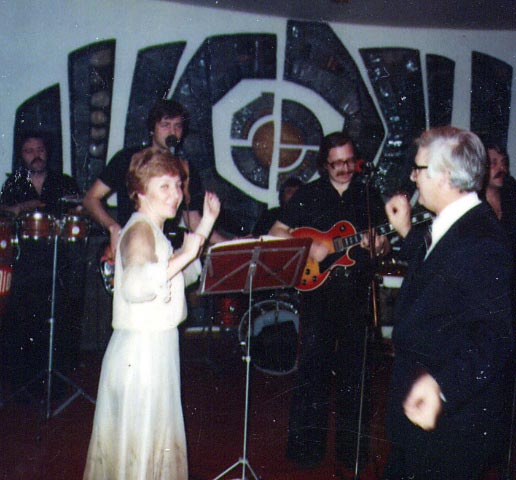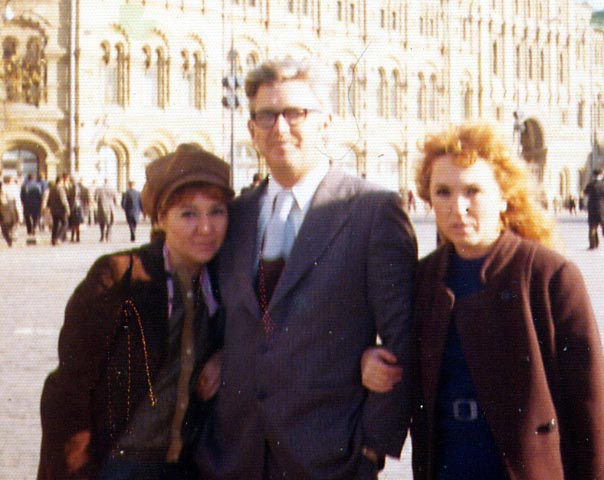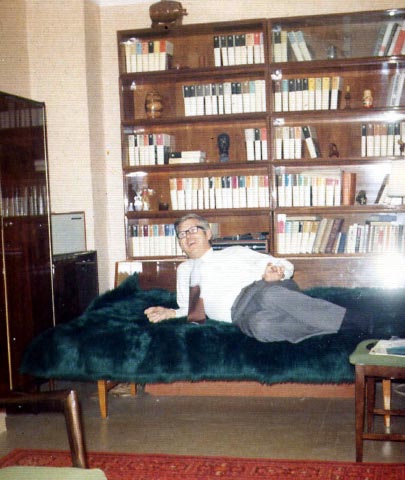Electric History
Vera
My future Russian wife's grandparents owned a medium-sized retail operation in the vicinity of Moscow. Lenin gave them a concession to remain in private business as long as they supported the party. Stalin took that away in 1931, but her grandparents were able to hide some gold, jewelry, and works of art. Their first granddaughter was born that year.
Vera Konstantinovna Jgelayova was born on May 18, 1940 at her grandmother's country home just outside Moscow. Her mother was studying medicine at the time.
Stalin made a pact with Hitler that allowed the Soviet Union to occupy Finland and part of Poland if the Soviets stayed on his side. Stalin was losing his grip on the people and he needed the war to survive.
When Stalin died Vera was a Soviet teenager, crying with the masses. The economy of the Soviet Union was upbeat after the devastation of war. New apartment blocks were rising in the open fields around Moscow. Many may have hated Stalin, but his popularity rested on food in the stomach and warm rooms. At this time Vera was a Captain in the Pioneers. This program was designed to train future Communist leaders but in reality was more like the Girl Scouts.
Vera remembers moving into a house with her mother some time after the war. She has a vivid memory of her grandmother swapping a diamond ring for a box of French chocolates. Her grandfather gave her the devil for such a waste. Her reply was: "We only live once and I have not tasted good chocolate for thirteen years."
Vera's mother was a medical doctor during her youth and while the pay was less than that of a steelworker, it was a position of status for her family. Every client brought a present to pay for the "free" service. Vera remembers the next several years as a series of gymnastics and ballet lessons from morning to night. She was relieved when her instep was injured and her teachers forbid her to put on ballet shoes again. This task was over, and Vera could be a little girl before she grew up.
In 1956 Khrushchev spilled the beans on the activities of Dictator Stalin in a secret meeting of the bosses of the Communist party. It was not long before people on the street knew that what they had suspected for a long time was true. Soon Vera was able to read books that were critical of communism under Stalin.
Vera's mother died suddenly just before Vera turned seventeen. Her half sister was five years older and the two met for the first time at their mother's funeral. Her sister had been well cared for as the out of wedlock daughter of a high KGB official. It was common for families to be separated during and after the war. This was a family secret and I am not sure Vera will approve this as an item in the final edition of this book. The grandparents were aging and wanted Vera to have the family of collection paintings and other fine art. A friend of the family was selected to be Vera's husband to look after the art until Vera was twenty-one. He attempted to forge her documents to make her look older but the authorities would not buy it because she was a late bloomer and looked more like thirteen. Many records were misplaced during the war and making new records was common. Vera's new husband made her continue her schooling in accounting.
Khrushchev will be remembered for banging his shoe on the table at the UN. His bureaucrats won their battle to stop his reform. With a small breath of freedom the youth of the Soviet Union became enthused to work harder in defense of the motherland. Vera remembers being on the fire lines, without success, to keep the frost from killing the early corn crop just outside Moscow. Khrushchev was not a farmer and was soon to lose his place at the top.
Vera completed her education and was assigned to her job. The Soviet system guaranteed every person a job, but on the flip side every person had to work, and there were no excuses. She was assigned to an audit team for a small factory in Moscow that made metal parts for rockets and other military applications. This was a secret job and she proudly signed an agreement that she would tell no one about her work. Most important of all, she would never speak to a foreigner.
She attacked her new position with vigor. The first report to be sent up the chain of command worried her. She saw that the managers of the factory were taking scrapped parts from previous months and passing them through the accounting system so they could show production levels at one hundred ten percent of requirements. She dutifully reported this to her manager, who told her: "Young lady should spend more time powdering your nose like the other girls do. This is an affair of the state. Keep your nose clean."
When Vera's grandfather passed away in 1965 and her grandmother was sent to a nursing home. Bulldozers demolished the grand old house where she grew up and eight of the concrete blocks sprang up on the old homestead.
Vera remembers this house and its gardens in vivid color. The house was built in the late nineteenth century near the center of Moscow, close to the present residence of the American ambassador. The property covered one city block and had a wooden fence around it about twenty feet high. She was always proud when she invited her friends to visit her. She moved with her husband into one of the concrete blocks about ten miles from the center of Moscow, about one month before the house was demolished. She took the small items from her family heritage, but there was no place to put the beautiful old furniture in her new one room apartment.
Vera will never forget the day in June 1973 when her childhood friend, Nadja, came to her apartment for help with a translation problem. Nadja had been divorced for almost two years and was dating a Moscow University student from Italy who was staying at the Rossia Hotel but when she called his room a person speaking English answered the phone. When Vera called the room a person speaking perfect Russian answered the phone so she turned the phone over to Nadja.
Nadja soon realized that her boyfriend had gone home and an American was living in the room. The Russian's name was Ilya LeCuch and he was working with an American capitalist on a big trade deal. The two made an arrangement to meet in front of the main Post Office the next evening at 7PM. Ilya arranged a method to be spotted and an agreement was made that both could call off the meeting if they did not like how each other looked.
At first Vera was reluctant but with her husband in Bulgaria on a one-year assignment she was ready to meet a capitalist. It was prearranged that Vera would pair up with the American since she spoke English. LeCuch reserved a table for four at the Intourist restaurant not far from the Bolshoie Theater and near the post office.
Vera's study of English was the Kings language and the American spoke with a southern drawl so Ilya had to translate. Vera did not want to drink vodka and the hillbilly did not know how to dance. After dinner Ilya invited the whole group to the foreign currency bar in the basement below the main restaurant where the Russian girls could never go by themselves. This bar had an upbeat band that played a mean Zorba the Greek several times each night.
Fresh squeezed oranges imported from Israel mixed with top of the line Russian Vodka tempted Vera to try a few. She found that her American escort was named James and his grandfather was John. Translated to Russian biblical names he became Demetre Ivanavich or Dema for short.

After several glasses of vodka Dema even agreed to dance with the group to the sound of Zorba. In a misunderstood translation Vera thought Dema had blue blood. She would later learn the truth was he was born blue and a grandmother rubbed him back to life.

At the end of the evening the hotel KGB stopped the ladies just outside the door to arrest them for being in a dollar bar. Vera learned that the KGB approved other girls in that bar and they were not. Ilya knew just what to do when he took the sweater from his back as a present. Telephone numbers were exchanged as LeCuch Nadja that he was going to take his American friend to meet some of his family in Riga and he would try to arrange tickets to an International film festival where a film Nadja wanted to see would be showing the following week.
The film festival was not interesting and her new found hillbilly embarrassed her by rolling up his coat and storing it on the floor under his seat. LeCuch suggested a café in the Metropole would be a safe place to have a late lunch. This time the hotel KGB stopped Vera and Nadja at the door. Vera was accused of taking dollars from Americans. To counter this she dumped the contents of her purse on the table and stormed out.

Vera was very upset and embarrassed with her country for acting in a way in front of her guest and to make up for it invited Dema to her apartment. She never expected to see this man again.
VERA (BEPA) is a very important story and events up to our marriage on the 25th of December 1979 will be recorded on this page. LATER

